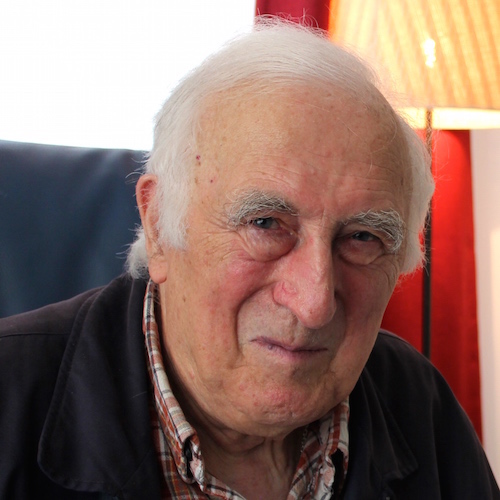 Culture & Ethics
Culture & Ethics
 Faith & Science
Faith & Science
The Heart of Human Exceptionalism Is Love

I’ve previously discussed the ethical ideas associated with Peter Singer, including infanticide, broad abortion, euthanasia, permission for bestiality, and doing medical experiments on the disabled. Yet he is looked upon as a respected ethicist, for example, in an article in the Wall Street Journal over the past weekend about his book urging that we give a third of our incomes to charity.
Now, let’s look at an example of ethics from the perspective of human exceptionalism, and where it leads. From an interview, also in the Wall Street Journal, with Jean Vanier (pictured above), whose Christian faith led him to found L’Arche, an international movement that provides home, care, love, and acceptance for people with disabilities:
"What people with disabilities want is to relate," Mr. Vanier says. "This is something unique. It makes people who are closed up in the head become human. The wonderful thing about people with disabilities is that when someone important comes, they don’t care. They care about the relationship. So they have a healing power, a healing power of love."
That power permeates L’Arche, but in the world outside, threats to human difference and the dignity of the disabled are proliferating. Prenatal screening has meant that a majority of fetuses diagnosed with Down syndrome are aborted, though some recent studies suggest the termination rate is declining. Advances in biotechnology and genetic engineering will make parents and physicians more likely to attempt to "design" away disabilities, to create perfect babies.
But biotech-aided parenting will be a messy business, Mr. Vanier warns. "They want to have babies according to what they want," he notes.
There is a different way:
After earning a doctorate in Aristotelian ethics from the Catholic Institute in Paris in 1962, Mr. Vanier began lecturing on both sides of the Atlantic. Father Thomas, meanwhile, became chaplain at an institution for the mentally disabled in Trosly-Breuil and urged Mr. Vanier to visit.
"I discovered this world," Mr. Vanier recalls. "People locked up in institutions. Parents feeling ashamed, pained." At an institution near Paris, he saw 80 men locked up in a building meant for 40. Violence and abuse were rampant. Elsewhere he saw a teenager chained in a garage.
"What do you do when you see something like that?" asks Mr. Vanier. His answer was to purchase a small house in Trosly-Breuil and invite two disabled men, Raphael Simi and Philippe Seux, to leave an institution near Paris and live with him as friends.
Raphael only knew 20 words and didn’t speak very much. "Whereas Philippe spoke too much," Mr. Vanier says with a smile. "The great thing about people with intellectual disabilities is that they’re not people who discuss philosophy. . . . What they want is fun and laughter, to do things together and fool around, and laughter is at the heart of community."
The men bought a trick mustard pot with a spring in the lid that would jump out when opened. "Raphael, he loved that," Mr. Vanier recalls. One day a state inspector visited the house, and Raphael "would push the mustard pot, inch it forward toward the inspector, and he finally opened it — and there was laughter! That was at the heart of everything. After long years of being looked down upon, being seen as stupid, they were finding a place of freedom and happiness."
Human exceptionalism is the road to applied love and unconditional inclusion:
Life at L’Arche is never easy, even with the added assistance of psychiatrists and social workers.
"L’Arche teaches us also the difficulty in meeting the poor," Mr. Vanier says. "Some have been too hurt, some have psychological problems. And so here we’re called to be very attentive to the needs of the other." This is the challenge that has proved attractive to thousands of nondisabled people.
But what about those who can’t take years off to serve? "Try and find somebody who is lonely," Mr. Vanier says. "And when you go to see them, they will see you as the messiah. Go and visit a little old lady who has no friends or family. Bring her flowers. People say ‘but that’s nothing.’ It is nothing — but it’s also everything." He adds: "It always begins with small little things. It all began in Bethlehem. That was pretty small."
Sure Singer urges us to give away large portions of income. But his heartless utilitarianism promotes invidious distinctions among humans, as well as exploiting the weak and killing the vulnerable. It seeks to shatter intrinsic human dignity — the consequences of which would by profoundly immoral and eventually tyrannical — and with malice aforethought.
A culture based on Peter Singerism and a culture steeped in human exceptionalism cannot occupy the same space. Which will we choose?
Image by Kotukaran, cropped by Gabriel Sozzi [CC BY-SA 3.0], via Wikimedia Commons.
